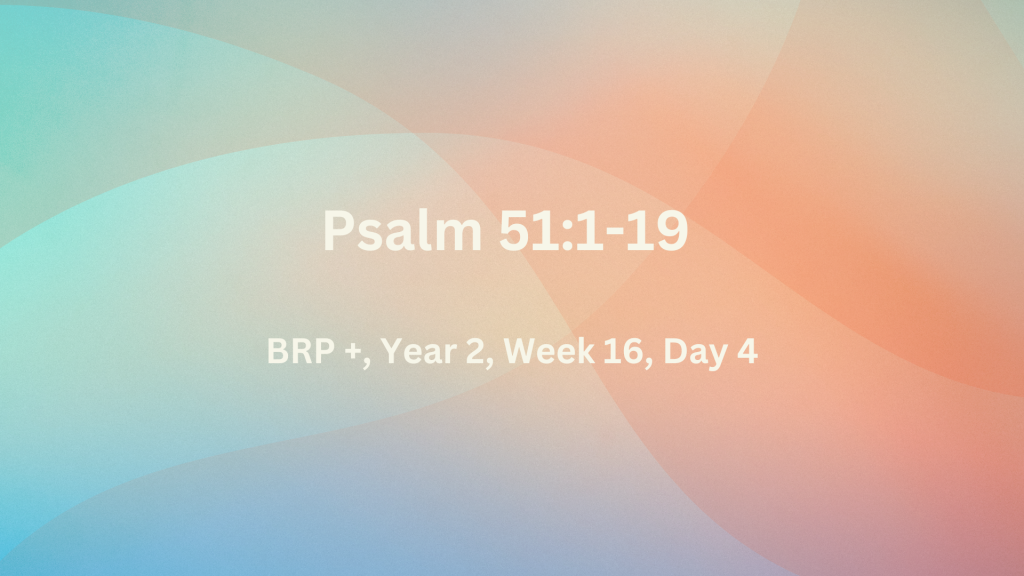Psalm 51:1-19
Q.1. What was the context of this Psalm? On what basis did David seek forgiveness from God? How did he view his sin? Did he accept God’s judgment on his failures? – (Ps.51:1-4)
This song was prefaced with the explanation: A Psalm of David, when Nathan the prophet came to him, after he had gone in to Bathsheba. David’s Psalms about creation are wonderful. However, this Psalm of humiliation after his serious moral failure is a favourite of all sinners. His heart’s cry was built on God’s character – Be gracious to me, O God, according to Your loving-kindness; According to the greatness of Your compassion blot out my transgression. Wash me thoroughly from my iniquity and cleanse me from my sin (Ps.51:1-2). He had sinned against Bathsheba, and then one of his commanders, Uriah the Hittite (Ps.51:14 c.f. 2 Sam.11:1-27; 23:39). However, David clearly identified his sin as being against God – Against You, You only, I have sinned and done what is evil in Your sight, so that You are justified when You speak and blameless when You judge (Ps.51:4). He totally accepted God’s judgment for his failure.
Q.2. How did David explain his problem with sin? Did this excuse his wrong? What was his earnest request to God? What was his concept of the Holy Spirit? Why did David seek to be right with God? – (Ps.51:5-13)
Today many people view sin as being relative. This means that rather than seek forgiveness, people usually excuse their failures. However, David had a truly biblical understanding of his problem with sin, based on Genesis – Behold, I was brought forth in iniquity, and in sin my mother conceived me (Ps.51:5 c.f. Rom.5:12-21). This means sin is a problem against God, which the Gospel explains was the reason why God sent His Son into the world (c.f. Jn.3:16-18). David took responsibility for his actions. He pleaded – Purify me with hyssop, and I shall be clean; Wash me, and I shall be whiter than snow. 8 Make me to hear joy and gladness, let the bones which You have broken rejoice. 9 Hide Your face from my sins and blot out all my iniquities (Ps.51:7-9). He longed for a pure heart again, as well as a willingness and steadfastness in his pursuit of God (Ps.51:10 & 12). The indwelling ministry of the Holy Spirit would not become a reality, until Christ had finished His atoning work. Nevertheless, David had an understanding that he could grieve the Holy Spirit and banish His blessing (Ps.51:11). David was the consummate servant of God. He understood the impact that his restoration could have on others – Then I will teach transgressors Your ways, and sinners will be converted to You (Ps.51:13). He yearned that his failure would inspire others to go on for the Lord.
Q.3. Of what blood-guiltiness was he guilty? Why was sacrifice inadequate to atone for his sin? What does God seek from sinners? What was David’s request for Zion? – (Ps.51:14-19)
David’s reference to blood-guiltiness was to do with his actions in having the faithful Uriah killed in the battlefront. This brought God’s condemnation through His prophet Nathan (c.f. 2 Sam.12:1-15). No doubt David had thought about how he could atone for his sin but realized that no sacrifice would avail (Ps.51:16). He concluded – The sacrifices of God are a broken spirit; A broken and a contrite heart, O God, You will not despise (Ps.51:17 c.f. Isa.57:15-16; 66:1-2). David did not overlook his role in preserving Mount Zion as the place of God’s presence and favour (Ps.51:18) – Then You will delight in righteous sacrifices (Ps.51:19).

